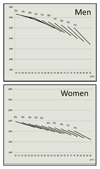Does nutrition play a role in the prevention and management of sarcopenia?
- PMID: 28927897
- PMCID: PMC5796643
- DOI: 10.1016/j.clnu.2017.08.016
Does nutrition play a role in the prevention and management of sarcopenia?
Abstract
There is a growing body of evidence that links nutrition to muscle mass, strength and function in older adults, suggesting that it has an important role to play both in the prevention and management of sarcopenia. This review summarises the discussions of a working group [ESCEO working group meeting 8th September 2016] that met to review current evidence and to consider its implications for preventive and treatment strategies. The review points to the importance of 'healthier' dietary patterns that are adequate in quality in older age, to ensure sufficient intakes of protein, vitamin D, antioxidant nutrients and long-chain polyunsaturated fatty acids. In particular, there is substantial evidence to support the roles of dietary protein and physical activity as key anabolic stimuli for muscle protein synthesis. However, much of the evidence is observational and from high-income countries. Further high-quality trials, particularly from more diverse populations, are needed to enable an understanding of dose and duration effects of individual nutrients on function, to elucidate mechanistic links, and to define optimal profiles and patterns of nutrient intake for older adults.
Keywords: Muscle mass; Muscle strength; Nutrition; Physical performance; Sarcopenia; Supplementation.
Copyright © 2017 The Authors. Published by Elsevier Ltd.. All rights reserved.
Conflict of interest statement
SMR, JYR, SCS, JAK, IB, HBF, OB, MC, BDH, JMK, FL, VM, YR, BV, MV, NAD, SA, AC, ACJ, AL, SM, JP, and R Roubenoff declare no competing interests in relation to this paper.
R Rizzoli has received consultancy, lecture fees and honoraria from Radius Health, Labatec, Danone and Nestlé. R Fielding has received grants from Nestle' Inc. during the conduct of the study; personal fees from Amazentis Inc, grants and personal fees from Nestle' Inc, grants, personal fees and other from Axcella Health Inc, grants and personal fees from Astellas Inc., personal fees from Cytokinetics, personal fees from Biophytis, personal fees from Glaxo Smith Kline, outside the submitted work. LJ van Loon has received consultancy fees from Nutricia Research BV. C Cooper has received consultancy, lecture fees and honoraria from AMGEN, GSK, Alliance for Better Bone Health, MSD, Eli Lilly, Pfizer, Novartis, Servier, Medtronic and Roche. J Bauer has received scientific grants from Nestlé and Nutricia DANONE, acted as a consultant for Nestlé and Nutricia DANONE and has received speaker honoraria from Nestlé, Nutricia DANONE, Fresenius, Novartis and Bayer. T Cederholm has received research grants from Nutricia and Nestle in the last five years. ML Brandi has acted as a consultant and has received grants from Alexion, Abiogen, Amgen, Eli Lilly and Shire. EV McCloskey is or has acted as a consultant, advisor, speaker and /or received research support from ActiveSignal, Amgen, Arthritis Research UK, AstraZeneca, Consilient Healthcare, EPSRC, GSK, Hologic, i3 Innovus, Internis, International Osteoporosis Foundation, Lilly, Medical Research Council, Medtronic, Merck, Novartis, Pfizer, Roche, Sanofi-Aventis, Servier, Synexus, Tethys, UCB, Unilever and Warner Chilcott. R Rueda is an employee of Abbott Nutrition.
Figures





References
-
- World Health Organisation. World Report on Ageing and Health. Geneva, Switzerland: 2015.
Publication types
MeSH terms
Grants and funding
LinkOut - more resources
Full Text Sources
Other Literature Sources
Medical
Miscellaneous

